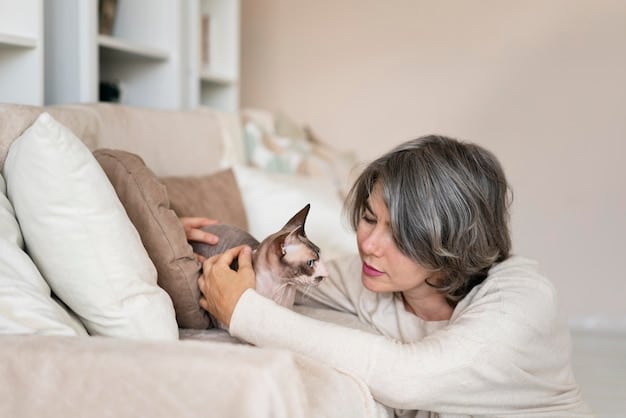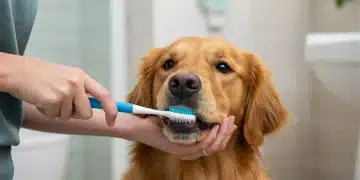Senior Pet Care: Adjusting Your Routine for Aging Pets

Senior pet care involves adapting your daily routine to accommodate your aging pet’s changing needs, including diet, exercise, living environment, and healthcare, ensuring their comfort and quality of life in their golden years.
As our beloved pets enter their senior years, their needs change. Providing the best senior pet care means adjusting your routine to ensure their comfort, health, and happiness during this special time.
Understanding the Needs of Senior Pets
Just like humans, pets experience age-related changes that require special attention. Recognizing these changes is the first step in providing appropriate care for your senior companion.
Senior pets, typically those over the age of seven, may start showing signs of aging such as:
- Reduced activity levels
- Changes in appetite
- Stiffness or difficulty moving
- Cognitive decline

Being aware of these potential issues allows you to proactively address them, improving your pet’s comfort and overall well-being. Regular vet check-ups become even more crucial during their senior years.
Adjusting Your Pet’s Diet
Nutrition plays a vital role in the health of senior pets. As pets age, their metabolism slows down, and they may require a different balance of nutrients.
Consider the following adjustments to your senior pet’s diet:
Smaller, More Frequent Meals
Smaller meals can be easier to digest and may help with maintaining a healthy weight.
Specialized Senior Pet Food
These foods are often formulated with lower calorie content and added supplements to support joint health and cognitive function.
- Look for foods with glucosamine and chondroitin for joint support.
- Consider foods with antioxidants for cognitive health.
- Ensure the food is easily digestible to avoid digestive issues.
Consulting with your veterinarian can provide tailored dietary recommendations suited to your pet’s specific health needs.
Modifying Their Exercise Routine
While senior pets may not be as active as they once were, regular exercise is still important for maintaining their muscle mass, joint health, and mental stimulation.
Adapting their exercise routine involves:
Shorter, More Frequent Walks
These can be less strenuous and more manageable for senior pets with mobility issues.
Gentle Play Sessions
Engage your pet in gentle play that doesn’t put too much strain on their joints.
Hydrotherapy
Swimming or walking in water can be a low-impact way to exercise and relieve pressure on joints.
Pay attention to your pet’s signals and adjust the intensity and duration of exercise accordingly. Avoid high-impact activities that could cause injury.
Creating a Comfortable Living Environment
Making simple changes to your pet’s living environment can significantly improve their comfort and quality of life.
Consider these modifications:

Orthopedic Beds
These beds provide extra support for achy joints and can help improve sleep quality.
Ramps or Steps
These can make it easier for senior pets to access their favorite spots, such as the couch or bed.
Non-Slip Flooring
Provide rugs or mats on slippery surfaces to prevent falls and injuries.
- Ensure their food and water bowls are easily accessible.
- Keep their environment clean and free of hazards.
- Provide a quiet and comfortable space where they can rest undisturbed.
By creating a safe and comfortable environment, you can minimize stress and improve your pet’s overall well-being.
Providing Enhanced Veterinary Care
Regular veterinary care is essential for senior pets. As they age, they become more susceptible to a range of health issues.
Focus on:
More Frequent Check-Ups
Senior pets should have check-ups at least twice a year to monitor their health and detect potential problems early.
Comprehensive Health Screenings
These screenings can help identify underlying health issues, such as kidney disease, diabetes, or arthritis, before they become severe.
Pain Management
If your pet is experiencing pain, work with your veterinarian to develop a pain management plan using medications or alternative therapies.
Early detection and treatment of health issues can significantly improve your senior pet’s quality of life and extend their lifespan.
Addressing Cognitive Decline
Cognitive decline, also known as cognitive dysfunction syndrome (CDS), is a common issue in senior pets, affecting their memory, learning ability, and awareness.
Strategies to address cognitive decline include:
Mental Stimulation
Provide puzzle toys, interactive games, and training sessions to keep their minds active.
Medication and Supplements
Some medications and supplements can help improve cognitive function and slow the progression of CDS.
Maintaining a Consistent Routine
A consistent routine can help reduce anxiety and confusion in pets with cognitive decline.
- Use visual cues and reminders to help them navigate their environment.
- Provide a safe and secure space where they feel comfortable and relaxed.
- Be patient and understanding, as they may experience frustration or confusion.
Recognizing and addressing cognitive decline can help maintain your pet’s mental sharpness and quality of life.
Embracing the Golden Years Together
Providing senior pet care is about more than just addressing physical needs; it’s about embracing this special time and strengthening your bond with your beloved companion. By making adjustments to their diet, exercise, environment, and healthcare, you can ensure they live their golden years in comfort, health, and happiness.
| Key Point | Brief Description |
|---|---|
| 🐾 Adjusted Diet | Smaller meals, specialized senior food for easier digestion and joint support. |
| 🚶 Gentle Exercise | Shorter walks, gentle play, and hydrotherapy to maintain muscle mass. |
| 🛏️ Comfortable Environment | Orthopedic beds, ramps, and non-slip flooring for easy movement and rest. |
| 👨⚕️ Vet Care | Frequent check-ups and screenings to monitor and address health issues early. |
Frequently Asked Questions
▼
Generally, dogs and cats are considered senior at around seven years of age. However, this can vary depending on the breed and size of the animal.
▼
Senior pets should visit the vet at least twice a year for check-ups. More frequent visits may be necessary if your pet has specific health concerns.
▼
Common health issues include arthritis, kidney disease, heart disease, diabetes, cognitive dysfunction, and cancer. Regular check-ups can help detect these problems early.
▼
Provide orthopedic beds, ramps or steps, and non-slip flooring. Gentle exercise and pain management can also help improve mobility.
▼
Signs include confusion, disorientation, changes in sleep patterns, decreased social interaction, and loss of learned behaviors. Consult your vet for advice.
Conclusion
Caring for a senior pet requires understanding their changing needs and making necessary adjustments to their lifestyle. By focusing on nutrition, exercise, comfort, and healthcare, you can ensure your aging pet enjoys a happy, healthy, and fulfilling life in their senior years, strengthening your bond and making the most of your time together.





